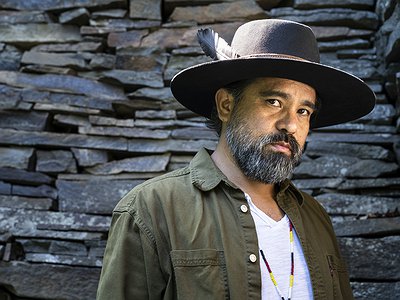Name: Cochemea Gastelum
Nationality: American
Occupation: Saxophonist, composer improviser
Current release: Cochemea's Vol. II Baca Sewa is out now via Daptone Records.
If these thoughts by Cochemea piqued your interest, visit him on Instagram, bandcamp, or his page on the Daptone Records website.
For an even deeper look into Cochemea's thoughts, check out our earlier interview with him, in which he speaks about Identity, Indigenous Culture and Deep Listening.
Tell me about your saxophone, please. How would you describe the relationship with it? What are its most important qualities and how do they influence the musical results and your own performance?
I started playing Saxophone fairly young. I had already been growing up with the sound of jazz music and fell in love with the instrument early on. I like the expressive and lyrical qualities that can be achieved with it. I like to think of it as singing through the horn. I listen to a lot of singers for phrasing and melodic shapes.
There is also a lineage of masters on the saxophone that I’ve studied and hold with reverance and respect, along with cultivating and nurturing my own personal voice.
What do improvisation and composition mean to you and what was their balance on Baca Sewa?
A lot of my compositions come out of either improvising or melodies that come to me. On Baca Sewa most of the tunes I composed beforehand, with that process: either playing piano and working the parts until something revealed itself, or taking melodic ideas that I had and constructing rhythmic patterns and arrangements around them.
The exception is the title track. My cousin Anthony Gastelum composed the melody for "Baca Sewa", which is an inter-tribal song he wrote for his son that became our family song. I wrote chords to the melody and played sax on the “song” portion with the band.
A couple of the songs were composed and arranged in the studio, but ALL of the music is arranged with the band and Gabriel Roth, who produces and engineers the records. With some of the songs, I had a specific rhythm in mind, but a lot of the time I like to leave it for the group to interpret and make up.
Derek Bailey defined improvising as the search for material which is endlessly transformable. Regardless of whether or not you agree with his perspective, what kind of materials have turned to be particularly transformable and stimulating for you?
My most memorable and satisfying experiences improvising have been where I feel as though I am an empty vessel. This goes for composing as well. But a lot of times I hold a feeling or an image in my mind as a starting point, or maybe a simple melodic phrase and go from there.
Purportedly, John Stevens of the Spontaneous Music Ensemble had two basic rules to playing in his ensemble: (1) If you can't hear another musician, you're playing too loud, and (2) if the music you're producing doesn't regularly relate to what you're hearing others create, why be in the group. What's your perspective on this statement and how, more generally, does playing in a group compare to a solo situation?
I think it depends on the situation. I’ve been on a lot of stages where I needed to have monitors to hear the other musicians, especially when playing with singers. To be able to hear everyone naturally is maybe the most satisfying and musical. But I think, to the second point, one has to always be listening. It’s the same for me wether I’m in a horn section or as a soloist in the group. The parts make up the whole. Knowing when to respond musically or to leave space is very important and moment to moment.
If I am actually doing a solo performance, the listening can be how my sound is reverberating in the room and playing off of that, or if I’m layering things or using effects, how those different sonic textures respond to each other.
How do you see the relationship between sound, space and performance and what are some of your strategies and approaches of working with them?
I think they all work together in ways that are seen and maybe not seen, but felt. Space can inform how the music is perceived and sound and performance can activate a space. Further, once these spaces are populated with bodies, something else happens.
I am interested in how sound and performance can create a transformative experience within a space. One strategy is to create an immersive experience within the space through image and or objects, and to activate these with sound and performance. A lot of spaces, for instance in clubs or on festival stages, rely more on the act of performance and sound as well as the relationship with the audience. There’s a sense of trust that needs to happen in a short amount of time for this kind of experience to occur.
For me, this means connecting with the people, though acknowledging our shared experience in the moment.
In a way, improvisations remind us of the transitory nature of life. What, do you feel, can music express about life and death which words alone may not?
I think the moment is really all we have, and what we do in that moment determines the next and so on. There is living and dying all around us, all the time. Moving from one note to the next can be seen in this way, as well.
Maybe I play something I didn't mean to, but I can embrace it and make it beautiful and with every other note that follows, I get another chance.

